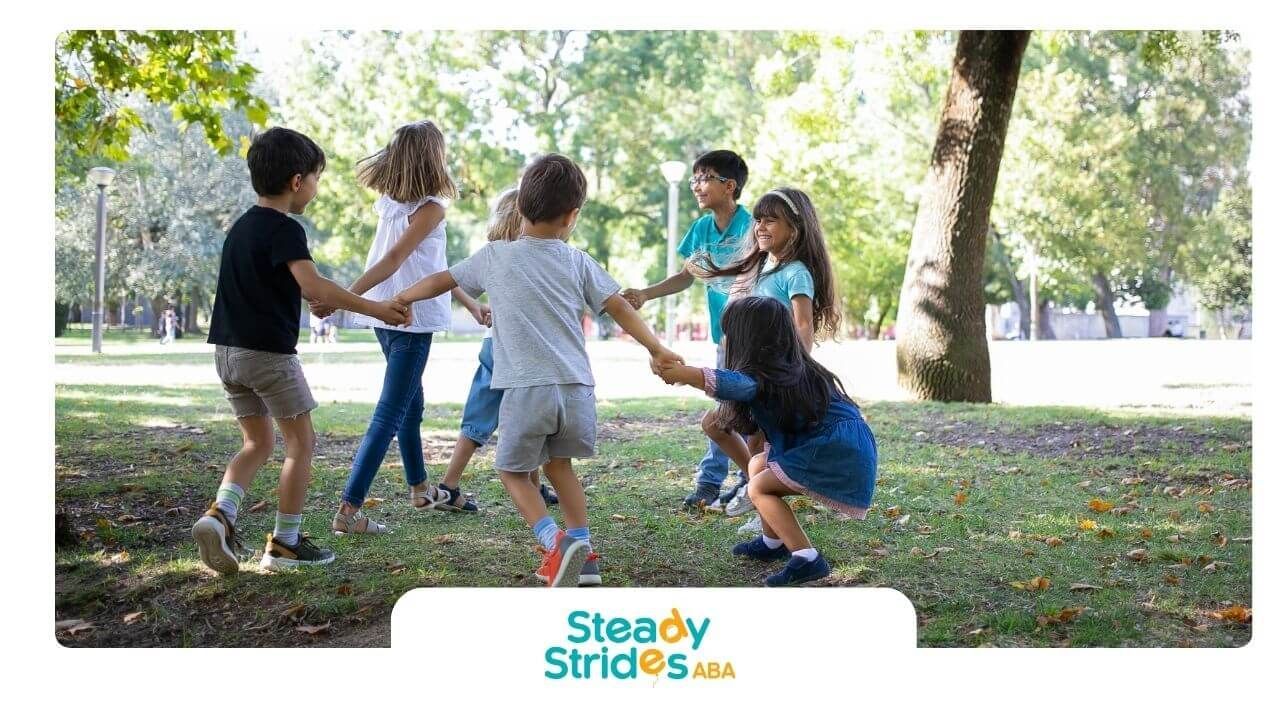Key Highlights
In Texas, there are many support groups for people on the autism spectrum and their families. These groups offer a sense of belonging and a place where individuals can share experiences and get help.
- The Autism Society of Texas provides both online and in-person support groups, along with social gatherings through virtual meetings.
- Across major cities like Houston, as well as in rural areas, you'll find available support groups.
- There are specialized groups too that focus on particular needs such as parents of children with autism or teen and adult support circles.
Autism is a complex brain disorder that affects people differently. It's something one lives with forever which influences how they interact socially, communicate, and behave. Despite its challenges though folks on the autism spectrum can really flourish given proper guidance & resources. A big part of finding this success comes from joining autism-related community supports–these spaces give not just camaraderie but also valuable advice to those navigating life affected by it In Texas specifically there’s no shortage when it comes to options tailored around various needs whether you're after digital meet-ups face-to-face encounters or even niche-specific assemblies This post aims at unpacking different kinds available here shedding light upon why having such networks matters plus tips locating ones near your area.
Introduction
Navigating the world of autism support groups in Texas can be both rewarding and overwhelming. Understanding the nuances and benefits of these groups is crucial for families and individuals navigating the autism spectrum. From online forums to in-person meetings, Texas offers a variety of options tailored to diverse needs. Regional differences in support availability can impact access, with major cities like Houston and Dallas boasting established networks. Exploring specialized groups can provide tailored assistance for parents, teens, and adults with autism. Stay tuned to uncover a wealth of resources and information to guide your journey.
Understanding Autism Support in Texas
Getting around the world of autism help in Texas means seeing how important community and support networks are for people on the autism spectrum. When you really get into what these autism support groups do, you start to see all the different kinds of help they offer that's specially made for folks with autism. Getting why these groups matter is key to making a place where individuals and families dealing with autism feel more included and supported.
The Importance of Community and Support
People with autism really get a lot out of being part of support groups. In these places, they can talk about what they're going through, ask for help, and feel understood by others who are in the same boat. With this kind of friendship and understanding around them, people with autism don't feel so alone anymore. Joining these groups lets them find helpful information, learn new ways to deal with challenges, and make friends that make their lives better overall.
Overview of Autism Spectrum Disorder (ASD) in Texas
In Texas, you'll find a wide variety of people on the autism spectrum, each with their own needs for support. The Autism Society of Texas is crucial in offering help and advice to both individuals and families dealing with ASD challenges. Whether it's in big cities like Houston and Dallas or smaller towns, there's a clear need for an extensive network of support groups and services because ASD is pretty common. It's really important to get what makes someone with ASD unique so we can build communities that are welcoming and supportive for everyone.
Types of Autism Support Groups Available
When it comes to finding help for autism in Texas, there are a bunch of different support groups out there tailored to meet various needs. You've got your choice between online and face-to-face meetings, plus specific groups aimed at families or individuals dealing with autism themselves. Online ones are great because you can join in from anywhere–all thanks to social platforms like Facebook and Meetup. Then, the face-to-face kind lets you actually meet people and build connections right then and there. For families, these groups offer loads of resources and support specifically for parents or caregivers looking after someone with autism. And for those on the spectrum? They get their own special space where they can chat about life experiences safely.
Now let’s dive into what makes online versus in-person support groups stand apart:
- With online ones, convenience is key since folks can hop on from home.
- In-person gatherings allow real-life interactions that help forge stronger bonds within the community.
- If you're living somewhere remote, online options might be your best bet due to limited local services.
- Meanwhile, in-person events often include group activities or workshops which could be really enriching.
- Being part of an online group means connecting with a wider circle who understand exactly what you’re going through even if they're miles away.
- Face-to-face meets also mean getting cues from body language which is something missing when we go digital.
Choosing between joining an online or an actual meetup spot boils down to personal preference along with considering what each person finds most helpful; some may opt for both just so they have as much backing as possible while navigating through life on the autism spectrum.
Online vs. In-Person Support Groups
In Texas, if you're looking for support with autism, there are both online and in-person groups that can help. With online groups, you get the ease of joining from any place which is great for fitting into busy schedules. On the other hand, meeting up face-to-face gives a comforting feeling of community and lets people really connect. Both kinds usually have meetings to offer support, social gatherings to meet others like you, and info on what's happening soon. So whether it's clicking through pages or shaking hands with someone new in person that suits your style better; there’s something out there in Texas just right for your needs.
Support Groups for Families vs. Individuals with Autism
In Texas, there are special groups that help both families and people with autism. Let's dive into what these two kinds of support groups do:
- For families:
These groups are all about giving parents and caregivers the tools they need to support their loved ones with autism. They're a place where you can share stories, get advice from others in similar situations, and find out about helpful resources and services. Often, they organize workshops, bring in speakers who know a lot about autism, or host events designed just for these families.
- For individuals on the spectrum: Here's where folks with autism can meet up in a friendly space made just for them. It’s perfect for making friends who understand what it’s like living on the, sharing personal experiences freely without judgment, and improving social skills through practice together; plus lots of fun activities tailored to things they enjoy.
Both types of support have one big goal–to make life better for those dealing with autism in Texas, offering crucial assistance every step of the way.
Regional Focus on Autism Support Groups
In Texas, support groups are a big deal for folks dealing with autism. From the busy streets of Houston to Dallas, the Autism Society of Texas has local chapters that provide important meetings and social gatherings. In cities like Houston, families have lots of events they can go to in person. But in more rural areas, people might lean on online stuff and email networks to find support. No matter where you are in Texas, there's a strong network of dedicated groups helping out the autism community.
Support Groups in Major Texas Cities
In big cities in Texas, like Houston and Dallas, you can find quite a few support groups for autism. These groups are there to help out by offering different kinds of services and resources. They also make it easier for people and their families to meet others going through similar experiences. Here's a look at some of the support groups found in Houston and Dallas:
| Group Name | Description |
|---|---|
| Houston Autism Support Group | This group helps by providing support, resources, and information specifically for those affected by autism around the Houston area. |
| Dallas Autism Support | In the Dallas area, this organization has various support gatherings, workshops, and events designed for individuals with autism as well as their families. |
These examples just scratch the surface when it comes to finding help within these communities. For more detailed info on what's available near you or someone you know who could use this kind of assistance; checking local listings or organizations dedicated to supporting autistic individuals is always a good step forward.
Finding Local Support in Rural Areas
In Texas, especially in the countryside, finding autism support groups might not be easy. But by using email or Facebook, people can join virtual social groups for help and advice. The Autism Society of Texas sometimes sets up events in various places, even rural ones, giving folks a chance to meet face-to-face. Looking around your local area for resources or starting your own small group meetings can also help those looking for autism support away from big cities. Online forums and communities are great ways to connect with others when you're living far from larger towns.
Specialized Support Groups
Within the autism community, there are special support groups designed just for certain folks. For example, some are made for parents who have kids with autism while others are meant for teens and adults dealing with it themselves. These groups aim to give help that's really specific to what their members need. By focusing on the particular challenges each group faces, they can offer advice and resources that hit closer to home. This way of doing things helps everyone feel like they're part of a community where people get what they're going through. Getting involved in these kinds of groups can make a big difference when you're trying to figure out life with autism spectrum disorders.
Groups for Parents of Children with Autism
Helping parents with kids who have autism is really important. These groups create a welcoming environment where people can talk about what they're going through and share helpful tips. The Autism Society of Texas often sets up meetings and sessions that are just right for what parents need. On top of that, some places even look after your kids for free while you attend the meetings. To keep in the loop about when these gatherings happen, parents should sign up for newsletters or check out social media pages related to this topic. By getting together with other moms and dads who understand exactly what it's like, there's a lot of comfort and advice to be found as you figure out how best to support your child with autism.
Teen and Adult Autism Support Groups
Support groups for teens and adults on the spectrum are all about helping them as they grow into adulthood. In these groups, people find a welcoming place to meet others, talk about what they're going through, and work on their social skills. With activities designed just for them, members get to make friends and do things that match their interests and talents. These gatherings aim to encourage folks to stand up for themselves, live independently, and form deep connections with others. Oftentimes there are fun outings planned like game nights or educational workshops focusing on jobs, learning opportunities, or how to handle relationships.
Activities and Events for Autism Support Groups
In Texas, there are groups that help people with autism and their families by setting up different kinds of activities. These events let everyone meet new people, learn things, and have a good time. Here's what they usually do:
- Workshops and seminars: There are often meetings where experts talk about important stuff like how to handle certain behaviors or find educational help. It's also a chance to figure out how to get the services you need.
- Social outings: For fun outside the house, these groups might organize picnics or trips to museums and other cool places. It’s a great way for folks to hang out together.
- Game nights and social gatherings: Sometimes, they put on game nights or parties so everyone can play games, chat, and enjoy each other’s company.
These sorts of things not only bring individuals with autism closer but also give them chances for learning more about themselves while having fun in the process.
Monthly Meetings and Workshops
Dive into a bunch of interesting workshops and regular monthly get-togethers put on by autism support groups in Texas. These meet-ups are packed with useful info about handling autism spectrum disorders and give you a chance to share stories and tips. You'll hear about the newest findings on ASD, get advice for everyday hurdles, and meet others who really get what you're going through. With activities that build skills and lots of helpful advice up for grabs, these events are perfect for anyone looking to better understand how to manage autism spectrum challenges. Make sure not to miss these valuable chances to learn more ways to cope.
Social Events and Outings
In Texas, autism support groups organize fun social events and outings that are perfect for people on the autism spectrum. With everything from sensory-friendly activities to events where everyone is welcome, these get-togethers help build social skills and friendships in a chill environment. To keep up with what's happening next, you can check out emails from the group or look them up on Facebook. Joining in these activities isn't just about having a good time; it also makes folks feel like they're part of the autism community.
Navigating Challenges with Autism Support Groups
When looking for autism support groups, it's all about finding one that matches what you're after. Think about if the group is more for families or just for individuals. Make sure the time and place they meet up works for you. It's also good to check out how their meetings are run to see if it suits your style. Staying in touch through email or Facebook can be really helpful too. Don't hesitate to try a few different ones until you find a group that gives you the kind of help and resources you need.
How to Choose the Right Group for You or Your Family
Finding the perfect support group for you or your loved ones is a big deal. Here are some pointers to help guide your decision:
- Start by figuring out what you need.
Think about whether an online or in-person group suits you better, what kind of help you're after, and if there's a certain age range among members that would work best for yourself or your family.
- With research on your mind, look into various groups either nearby or online. Check their websites, go through any reviews people have left behind, and don't hesitate to contact someone in charge for more details.
- By attending one of their meetings or events when possible, lets you meet others who are part of it firsthand. You can see how things run and decide if it feels right for what you're looking for.
- On the topic of getting advice, talk to folks who've been part of support groups around where they live. They might share useful tips from their own experiences.
In essence, picking a suitable support group could really impact your journey with autism positively. It’s worth putting effort into finding just the right fit based on your needs.
Tips for Getting the Most Out of Support Groups
Make sure you're really getting involved in the discussions, throwing out questions, and talking about your own experiences when you're with your support group. By connecting with other members even beyond the meetings, you help create a strong sense of belonging among everyone. With upcoming events always on the horizon, keeping up-to-date ensures that you stay active within the community. For extra backing or to catch up on what's missed, don't forget to use online tools like email lists or Facebook groups. And if there's ever a moment where you need some specific advice or want to suggest new ideas, please feel free to talk directly to those running it.
Conclusion
In Texas, there are support groups for autism that really help bring people together. These groups understand what individuals and families go through when dealing with Autism Spectrum Disorder (ASD). No matter if you're looking for something online or prefer meeting up in person, there's a group out there for everyone. This includes big cities as well as smaller towns. They offer lots of different things like special meetings just for parents, fun activities, and workshops to learn more about ASD. If you're trying to find the right group, don't worry—there are tips that can make it easier. So why not check out all the different kinds of support available in Texas? It could be a great way to create a supportive space for yourself or someone close to you who is affected by autism spectrum challenges.













